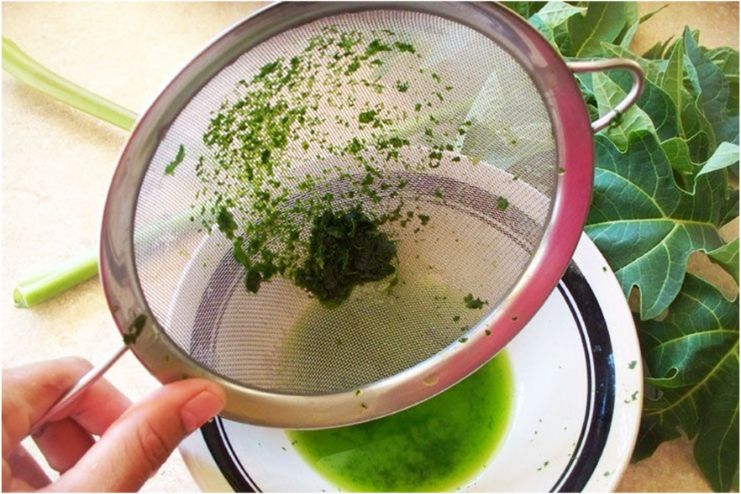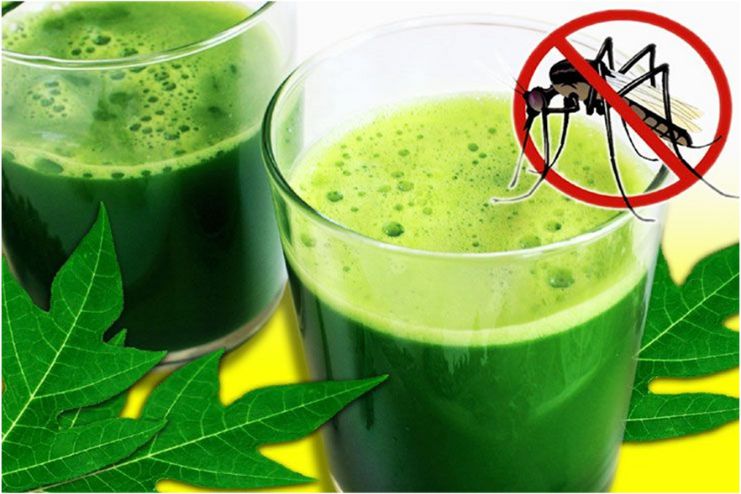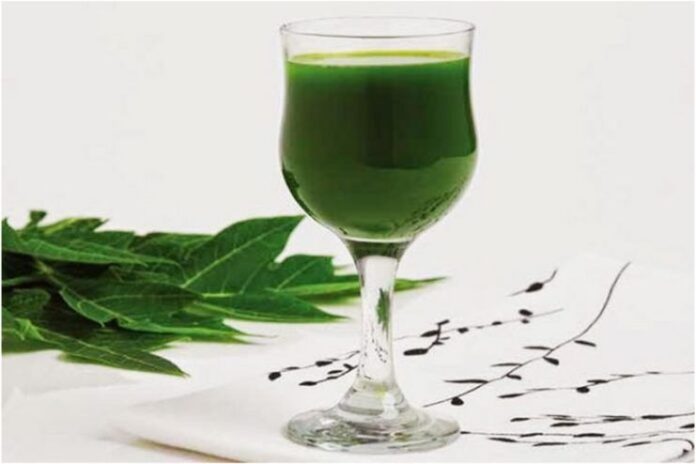Affiliate Disclaimer
Some links in this article are affiliate links. We may earn a small commission if you make a purchase through these links, at no extra cost to you. We only recommend products we find useful to our readersPapaya is a widely consumed tropical fruit popular for its health benefits. But, have you ever heard of the uses of papaya leaves and how papaya leaf extract helps improve health and beauty?
In this article, we have listed the amazing benefits of papaya leaf juice and how to prepare it. Read through and make the most of nature’s amazing gifts in the form of fruits and leaves.
Nutrients Present In Papaya Leaves
Papaya leaves are nutritionally dense. The phytonutrients present in papaya leaves enhance the immune system and display strong antioxidant properties. Alkaloids, papain, and phenolic compounds in papaya leaves display positive gastric effects like smooth digestion and relief from bloating.
Also, papaya leaf compounds like carpaine, alkaloid compounds, dehydrocarpaine, and pseudocarpaine provide chemopreventive effects.
The papaya leaf extract offers antibacterial, analgesic, and antispasmodic properties. The leaves are rich in minerals like magnesium, sodium, calcium, potassium, manganese, and iron. The other phenolic compounds exhibit potent antioxidant effects.
How To Make Papaya Leaf Juice, Extract, and Tea
Papaya Leaf Juice: The preparation method for papaya leaf juice is pretty simple.
Things Required:
- Juicer
- A few clean papaya leaves
- 1 cup of drinking water
How to Make:
- Put the papaya leaves in a juicer and add water. Juice it.
- Strain out the juice using a muslin cloth.
- Transfer it to a bottle and refrigerate.
- The refrigerated juice should be consumed within 4 to 5 days.
It is better to start drinking just one spoon of papaya leaf juice a day, as it is bitter to taste, and take two spoons if you are taking it for therapeutic purposes.
Note: Do not drink water immediately after consuming the concentrated papaya juice to extract the maximum benefits of the juice.

Papaya Leaf Tea: making the tea is also a simple process and comes with many benefits. Here’s how to make it.
What Is Required:
- 3-5 medium-to-large papaya leaves
- 2 liters water
How to Make:
- Add clean papaya leaves to a small saucepan containing water.
- Allow the leaves to boil until the water has reduced to half the quantity.
- After cooling, discard the leaves and consume the tea in small doses.
Papaya Leaf Extract: you can make papaya leaf extract at home using the method below:
What Is Required:
- 50 grams papaya leaves
- 50 ml water
- 25 grams sugar
How to Make:
- Collect fresh, healthy, mature papaya leaves and wash them thoroughly.
- Chop them into small pieces and transfer 50 g papaya leaves into a mortar and pestle.
- Add 50 ml of boiled and cooled water and 25 g of sugar.
- Grind the mixture for 15 minutes to make a uniform pulp.
- Set aside the pulp for 30 minutes, then squeeze to get the papaya leaf extract.
- Store the extract in a bottle for 24 hours in the refrigerator.
- Shake well before use.
Also, papaya leaf extracts can be purchased as leaves, capsules, and tinctures. Ensure to buy these from organic stores—work papaya leaf juice into your juicing routine to maximize its healing effects.
If the bitterness of the papaya leaf juice interferes with its goodness, consume it with other juices like coconut.
Health Benefits of Papaya Leaf Juice
Jam-packed with health benefits, papaya leaf juice is quickly gaining importance in nutrition circles. The leaf, too, like the fruit, is rich in enzymes like papain and chymopapain, thus aiding with digestion, bloating, and digestive disorders. Listed below are the health benefits of papaya leaf juice.
1. Dengue Fever

Papaya leaf juice is the most common remedy advised for dengue patients. Infected Aedes mosquitoes cause dengue, which is manifested in the form of dengue fever. This severely drops the platelet count.
Papaya leaf extracts are known to cure dengue. Several studies revealed that papaya leaf juice increases the platelet count (R).
Here are some precautions and guidelines to be followed while using Carica papaya leaf extract for dengue fever patients:
- Dengue NS1 antigen test helps diagnose the disease in case of fever, body pain, and headache.
- If the test turns positive, seek immediate medical health.
- Papaya leaf juice can be used as a part of holistic dengue management.
- 30 ml of papaya leaf extract should be taken by adults thrice a day before each meal.
- For a child, 5 to 10 ml of papaya leaf syrup can be given until he or she recovers from the illness.
- Do not stop treatment mid-way.
- In case of allergies to papaya, avoid papaya leaf extract.
2. Anti-Malarial
Papaya leaves come with strong anti-malarial properties due to the presence of a compound called acetogen. This compound can help prevent diseases like dengue and malaria.
3. Digestive Health
As mentioned earlier, enzymes like papain and chymonpapain are effective in aiding digestion, cleaning the colon, and preventing constipation.
The enzymes amylase and protease help break down carbohydrates, proteins, and minerals, which help improve digestion. The anti-inflammatory properties soothe stomach ulcers and heal peptic ulcers.
4. Liver Health
Papaya leaf extract is a potential cleansing agent for the liver. It works well in healing liver diseases like liver cirrhosis (1) and jaundice.
5. Lower Blood Sugar Levels
Papaya leaf juice works by regulating insulin production and checking on blood sugar levels. The antioxidants in it help soothe consequent diabetic complications like fatty liver and kidney damage.
6. Menstrual Pain
Lower abdominal pain and menstrual cramps during periods are monthly symptoms most women deal with. Papaya juice can ease menstrual symptoms. The extract can also relieve PMS symptoms (2).
7. Benefits for Hair
Papaya leaf extract benefits hair health by promoting hair growth and preventing hair thinning and balding. It is a key ingredient in most anti-dandruff shampoos. An alkaloid component called karpain, present in the papaya leaves, helps remove dirt and oil from the scalp and is a natural conditioner.
8. Benefits for Skin
Vitamins A and C in papaya leaf juice help boost skin health, making it radiant. It suppresses free-radical activity and checks the growth of excess micro-organisms. The leaf extract also protects against skin problems like freckles and acne.
9. Reduces Cancer Risks
In a study published in the Journal of Ethnopharmacology, enzymes in papaya leaf fight cancers like pancreatic, lung, liver, and breast cancer due to the compound acetogenin. The extract’s anti-inflammatory properties help reduce chemotherapy side effects and inflammation.
10. Kidney Stones, Dysentery, and Diarrhea
The high fiber content of papaya, even in its leaves, contributes to the digestive system and reduces skin irritation when consumed moderately. The extract also helps gradually remove kidney stones.
Side Effects Of Papaya Leaf Juice:
It is essential to be aware of the side effects of papaya leaf juice before adding it to your daily routine or picking it as a therapy. Check out the side effects of papaya or papaya leaves:
1. Papaya Leaves Can Be Toxic
For people sensitive to papaya sap, it may be an irritant, dermatogenic, and vesicant and can injure the skin. Latex in papaya can induce gastritis and trigger asthma, weight, and rhinitis.
2. High Vitamin C
As the fruit and leaves are rich in Vitamin C, overconsumption on a long-term basis may lead to fullness and bloating in some people.
3. Avoid During Pregnancy
Papaya consumption has to be limited during pregnancy as the enzyme papain may transform proteins into amino acids. Bitterness may worsen the morning sickness and other pregnancy side effects. In some cases, it may cause miscarriage.
Conclusion
Papaya leaf extract is full of nutrients and natural compounds that have numerous health benefits. It boosts digestion and enhances liver health to combat serious illnesses, including dengue, malaria, and cancer. Papaya leaf extract also relieves menstrual pain, promotes skin and hair health, and regulates blood glucose levels.
However, you should check for possible side effects before adding it to your daily routine or as a therapy. Consume it in moderation, especially when you have sensitivities or are pregnant.
Add papaya leaf juice, tea, or extract into your routine to improve your overall health.
FAQs:
1. Can You Eat Papaya Leaves?
The tropical tree-like plant papaya bears versatile fruit that can be eaten ripe or unripe. Yes, you can eat the leaves. However, the papaya plant is considered a medicinal tree, and the entire plant, including the roots, leaves, and fruit, has medicinal value.
- In Brazil, an unripe papaya fruit is often used to make preservatives and sweets.
- The black seeds of papaya fruit have a sharp, spicy taste and are edible.
- The seeds may also be ground and used as a substitute for black pepper.
- In many parts of Asia, young papaya leaves are steamed and eaten like spinach.
2. How Can You Eliminate the Bitter Taste of Papaya Leaf Juice?
Do not let the bitterness of papaya juice deter you from trying it. Considering its many health benefits, find ways to improve the bitter taste. Proper processing can help eliminate the bitterness.
If the bitterness of the papaya leaf juice interferes with its goodness, consume it with other juices like coconut. The easiest way is to boil papaya leaves and cook them in water until they are soft. Rinse the steamed leaves in lukewarm water before preparing the leaf extract.
-
Jan 2018Written by Sumana Maheswari
-
Nov 2024Edited by Lakshmi Gayatri
In this Article

















